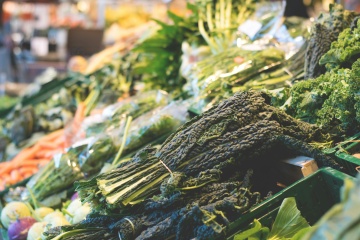Women, Infants & Children (WIC) Program

For Dane County, Wisconsin
Help keep your growing family healthy and strong! Learn what the WIC Program can do for you.
Call or text to make an appointment: 608-267-1111 or
Appointments available by phone or in person.
Our offices are open:
East Washington Office, 2705 E. Washington Ave:
- Mondays 8:30 am – 5:00 pm (closed 1:00 – 2:00 pm for lunch)
- Wednesdays 8:30 am – 5:00 pm (closed 1:00 – 2:00 pm for lunch)
- Fridays 8:00 am – 4:30 pm (closed 1:00 – 2:00 pm for lunch)
South Madison Office, 2230 S. Park St:
- Tuesdays 8:30 am – 5:00 pm (closed 1:00 – 2:00 pm for lunch)
- Thursdays 2:00 pm – 6:00 pm
How can WIC support my family?
WIC staff helps you eat healthy, have a healthy pregnancy, breastfeed successfully, and have healthy kids.
-

Healthy food benefits
You’ll get food benefits each month to buy foods like beans & peas, cereal, cheese, eggs, fruits & vegetables
-

Personalized nutrition education
We’ll help you know what to eat for a healthy pregnancy and healthy kids.
-

Referrals to services
We can give you information to get health insurance, FoodShare, Head Start, and more!
How does WIC work?
Find out if you’re eligible
To be eligible for WIC benefits in Wisconsin, you must:
- Live in Wisconsin; AND
- Are pregnant, had a baby in the past six months, or are breastfeeding a baby under 1 year old; AND
- Meet WIC income guidelines
- You may be able to get WIC benefits if you use one of these programs:
- FoodShare
- Medicaid
- BadgerCare Plus
- Wisconsin Works Program (W-2)
- You may be able to get WIC benefits if you use one of these programs:
Any legal guardians, including kinship care and foster parents can apply for WIC for their children.
Before your appointment
- If you have a scheduled appointment, you'll get two text reminders: one the day before your appointment and one the morning of your appointment.
- If you have a telehealth appointment, you will call us at the time of your appointment.
- If you miss your appointment, you'll get a text asking if you want to reschedule.
What happens at my appointment?
Learn what happens at your first appointment in this short video.
You’ll need to show us:
- Address and income for the past 30 days for your household.
- Proof of ID for you and your children getting WIC benefits.
- See the Wisconsin WIC webpage for examples of proof of identity, address, and income.
- If you are enrolled in a similar program, like Medicare or FoodShare, you do not need to provide any of these items.
We’ll do a screening of your health and nutrition. If you have an in-person appointment, this will include:
- Height and weight measurements
- Questions about your health and diet
- A test to see how much iron is in your blood
You’ll get an eWIC card at your appointment that you’ll be able to use that day to buy food.
How do I use my WIC benefits?
Where can I use my WIC benefits?
Stores that accept eWIC (Spanish: Tiendas que aceptan eWIC)
Can I shop at the farmers’ market?
Beginning in July, you can get a booklet of checks to buy fresh fruits, vegetables, and herbs at farmers’ markets. Checks are available until funds run out.
- Each family member over 9 months old who is on WIC will get a booklet of checks that total $25 once per year.
- Checks must be used by October 31st.
- Markets and Farm Stands that accept WIC Farmers' Market Checks (English and Spanish)
- What you can buy with WIC Farmers' Market Checks (Spanish)
- How to double your dollars if you have FoodShare
What foods can I buy with my WIC benefits?
Is there an app for using my WIC benefits?
Wisconsin MyWIC app (Google Play Store)
Wisconsin MyWIC app (Apple Store)
- Search WIC foods
- View benefit balance
- Find stores
- View WIC messages
What do I do if I had a problem using my WIC benefits at the store?
Can you help me with breastfeeding?
Some families feed their baby at the breast/chest. Others use pumps, use donor milk, or formula. There are different ways to feed a baby and we support your choice.
Call or text 608-267-1111 and talk to us for free about feeding your child.
I need a breast pump
- If you have BadgerCare, Medical Assistance, or other insurance, call your healthcare provider.
- If you don’t have BadgerCare or Medical Assistance and are on WIC, call or text 608-267-1111.
Where can I find more help in the community?
Need help with housing, utilities, mental health, substance use, or other topics? Check out our Community Resource page!
What are my WIC rights and responsibilities?
The Wisconsin Department of Health Services outlines your WIC rights and responsibilities.
Nondiscrimination Statement
We do not discriminate on the basis of race, color, national origin, sex (including gender identity and sexual orientation), disability, or age. Read our Nondiscrimination Statement (English, Spanish, Hmong)
Note:
- We often use the terms “woman,” “women,” “maternal”, and female gendered pronouns “she” and “her” when discussing the perinatal population, pregnant people, and people who give birth. We are limited with word choice when it involves programs like the Women, Infants and Children (WIC) and Maternal Child Health (MCH). It is important to recognize that these populations include people who identify as women, and also do not identify as women, including some gender-diverse people and some transgender men. We acknowledge the existence and validity of all people along the sex, sexuality, and gender spectrums.
- We recognize this as a barrier for our intended audience and may limit who researches and ultimately views/accesses this information. We also recognize this barrier in collecting and reporting data, as it limits community members from seeing themselves accounted for in the data.


